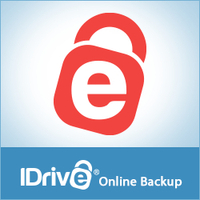Best cloud document storage of 2025
Store, sync, and share your documents online

The best cloud document storage is one of the most convenient ways for teams and businesses to share files and collaborate securely, helping to boost both efficiency and productivity.
When it comes to managing a business on a day to day basis, it can become quickly overwhelming and confusing to try and sort and store all the different files types - especially if you're trying to collaborate with colleagues across teams. The best cloud document storage services are here to make everything simple and easy.
We've been testing cloud storage services for years, looking at the best cloud storage, the best free cloud storage, and even the best document management software, so we know what matters when it comes to sharing documents through the cloud. So in our testing, we make sure to check both upload and download speeds, storage capacities at multiple price points, customer support options, alongside privacy and security compliance.
Google Drive holds our top spot for the best cloud document storage thanks to its free 15GB tier and very reasonable pricing options for expanded storage. Dropbox is a close second thanks to its range of app integrations, with Egnyte rounding out the top three for its expansive user management tools.
Today's best cloud document storage deals
IDrive is the best cloud storage provider
IDrive, the cloud storage veteran, delivers tons of storage online for an incredibly small outlay. 10TB for $3.98 for the first year is unmatched till now and so is the support for unlimited devices and the extensive file versioning system available.
pCloud provides 2TB lifetime cloud storage subscription
This Swiss-based company is more expensive than the competition, but a one-off payment for a lifetime cloud storage allowance means that you won't have to worry about renewal fees that can be very horrendously expensive.
The best cloud document storage of 2025 in full:
Why you can trust TechRadar
Best cloud document storage overall
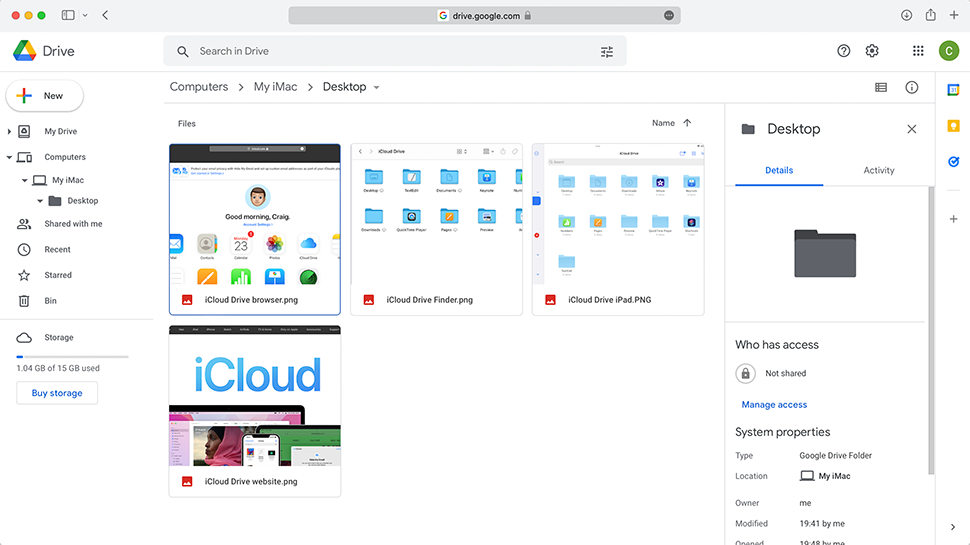
Specifications
Reasons to buy
Reasons to avoid
Google’s cloud document storage solution is excellent - with its 15GB free storage capacity and deep integration with the company’s mobile apps and the G-Suite workspace.
In our review of the service, we found it “provides a powerful, robust cloud storage service for both consumer and business needs.” Like just about every mainline Google product, Drive is beautifully designed. Easy to use, intuitive to navigate, and in our experience, super-fast to synchronize, everything here ‘just works’.
But Google Drive doesn't have everything - notably bare metal backups and end-to-end encryption are missing, so it’s not a full cloud backup solution.
And while that free 15GB may sound generous compared to Dropbox and OneDrive, this includes all your storage use across Gmail, Google Photos, and all other Google products.
So, your storage quota's likely to fill up fast - especially if you’re storing lots of videos and images, but you can increase your storage up to 2TB with a variety of Google One subscription plans.
Read our full Google Drive review.
Best cloud document storage for beginners
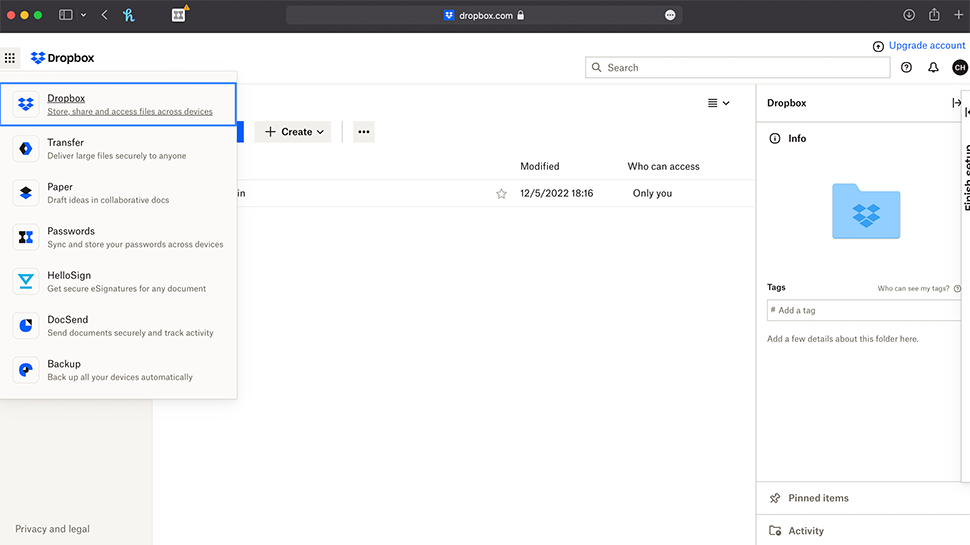
Specifications
Reasons to buy
Reasons to avoid
Dropbox is one of the simplest cloud document storage platforms to use, letting you easily drag-and-drop files into the desktop app, sync across all platforms, and store almost any filetype with no compatibility issues. It even works on Linux, which neither Google Drive or OneDrive supports.
It’s not quite perfect, but it’s one of the best in the business. In our review (linked below), we said that “it offers intelligent, reliable, secure file syncing and cloud storage that anyone can use. Really it is not an overstatement to say that Dropbox can genuinely change the way you work.”
Instead of syncing all files across your hard drive, Dropbox occupies a single folder location and everything you need to be synced with other devices should be saved there.
Dropbox isn't a online collaboration tool, so you might feel like you're getting less for your money, especially when the subscription prices aren't cheap compared to competitors. However, it absolutely excels when you need to sync files and folders between devices running different operating systems.
Read our full Dropbox review.
Best cloud document storage for business
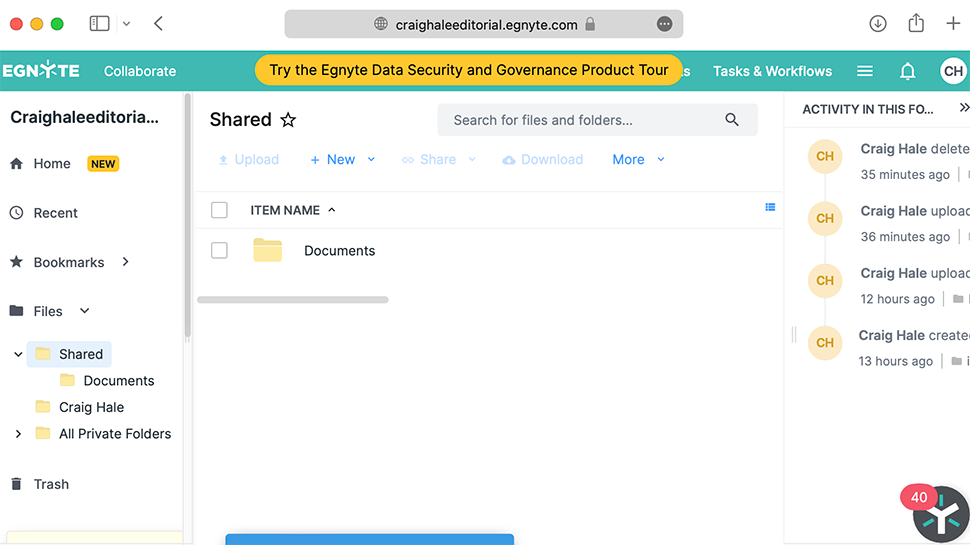
Specifications
Reasons to buy
Reasons to avoid
Egnyte might not have the name recognition of bigger brands like Dropbox, Google, and Microsoft. But after we tested the platform, no-one can doubt that the provider offers one of the best cloud document storage solutions for those that know their way around cloud services.
It’s a cloud storage service for business, first and foremost. With its strong security credentials, there’s a heavy emphasis on data management, user profiles, controlled access, regulatory compliance, and much more.
It’s fair to say the desktop apps are pretty bare bones, although the web app is impressively designed. It was something we noted when reviewing the service, noting that “while it might at first glance seem a little sparse in terms of what you get compared with alternatives from the likes of Google or Microsoft, Egnyte smartly focuses on what businesses need most from a cloud storage system, and then delivers it.”
Being an enterprise-focused product, Egnyte is more expensive than others on this list, and you probably need some technical knowledge to set it up, but it’s a great option for digitally-minded, security-conscious companies.
Read our full Egnyte review.
Best cloud document storage for security
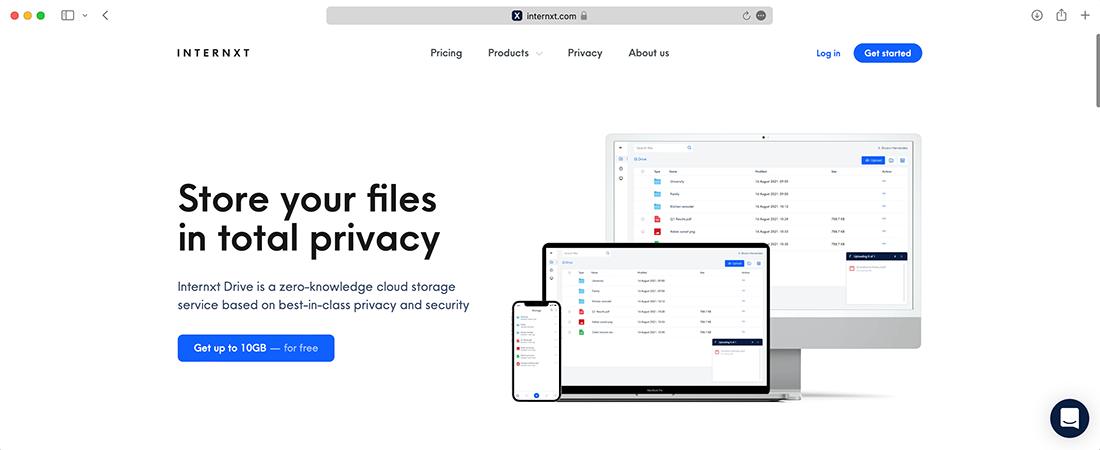
Specifications
Reasons to buy
Reasons to avoid
Internxt offers a suite of secure services across its cloud storage offerings, prioritizing the security of your files while they are stored or in transit making it a great option for teams looking for a service that emphasizes privacy - especially with Internxt's guaranteed GDPR compliance and two-factor authentication across all plans.
The platform includes several tiers of cloud storage, allowing you to upgrade your storage as and when you need it at a highly competitive price, with the option of an Enterprise plan for larger businesses looking for a plan with unlimited team access.
Where Internxt shines is in its interface, which is incredibly intuitive and easy to navigate, with those who still manage to struggle using the service having access to helpful and reliable premium customer support. In our testing, we found that much of Internxt's security features are very much in the background, so don't be put off thinking that you'll have to fiddle with any privacy or security settings when uploading or downloading your files.
As an extra bonus, Internxt's cloud storage is already using post-quantum encryption, protecting it from 'harvest-now-decrypt-later attacks', and essentially making it un-crackable in the event your encrypted data is somehow stolen.
While we found that the download speed could have been a bit faster, overall the speeds are very manageable and in line with what you would expect from a cloud storage service with this level of encryption.
Read our full Internxt review.
Best cloud document storage for small teams
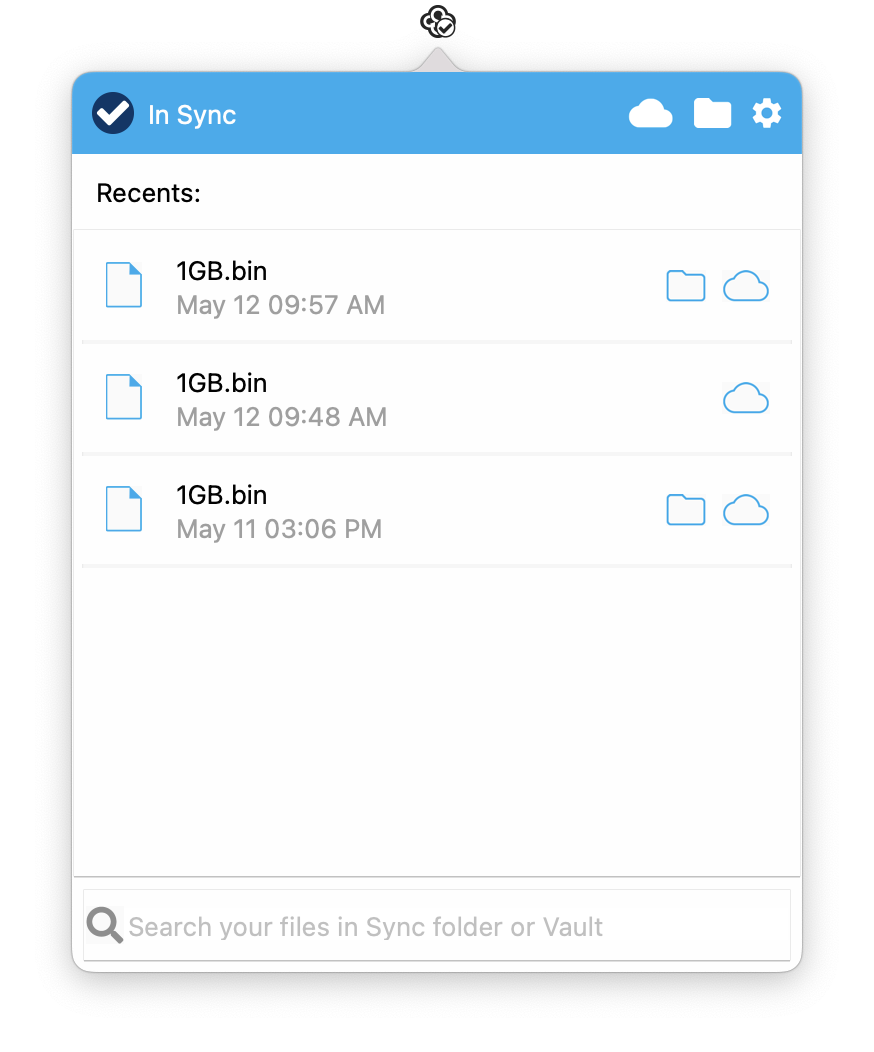
Specifications
Reasons to buy
Reasons to avoid
If you’re looking for a way to quickly synchronize and share files, Sync.com is a good option - and we found it particularly useful for individuals and small teams.
Running the desktop app, available for Windows and Mac, is a simple exercise. At launch, it creates a folder on your machine - and anything you drop in here will sync with the cloud and on collaborators’ machines. However, external drives and any folders outside of your primary Sync.com folder can’t be included, which we found disappointingly limiting.
It’s a minor issue overall, though, with the service providing a fluid and seamless platform for digital document storage in the cloud. While there’s a real focus on creating a streamlined ecosystem, essential features are excellent, including file versioning, file recovery, advanced sharing controls, and security and data compliance tools. Better still, we found no file size limits, so you can upload large media files provided you have the storage capacity. Sync speeds also proved good in our tests, with a 582MB folder of assorted images and documents uploading in 55 seconds.
The platform offers a somewhat low 5GB free storage - with personal and professional subscription plans, which start at $8 a month paid yearly, offering 2TB storage. In total, there are six plans to choose from, including unlimited storage for teams and a heavy-duty Enterprise option. This gives Sync a fair amount of flexibility here, without being overwhelming in its subscription packages.
Read our full Sync.com review.
Best cloud document storage for Windows
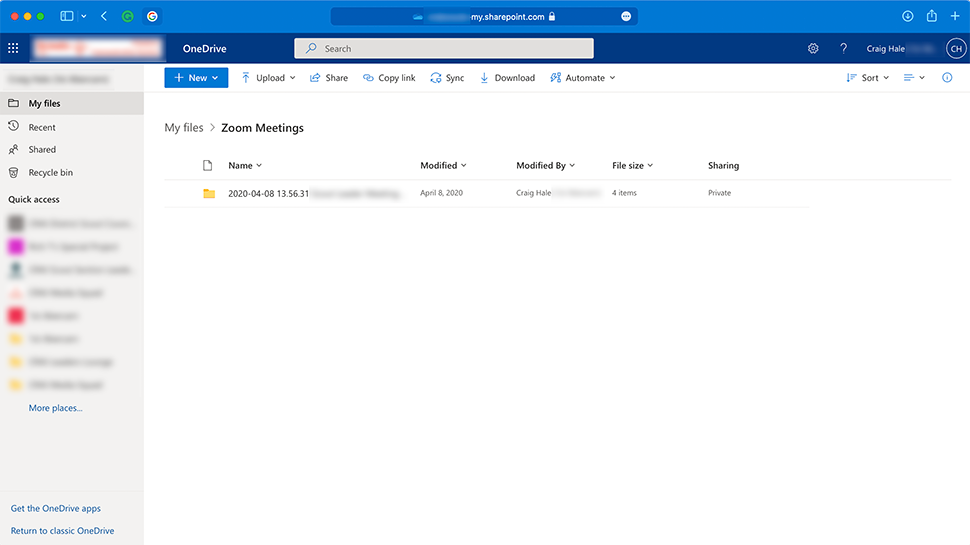
Specifications
Reasons to buy
Reasons to avoid
There was a time when Microsoft lagged behind the likes of Google, Dropbox, and Apple in the cloud document storage stakes. However, as it stands, Microsoft OneDrive is a superb example of digital document storage done right.
OneDrive is an accessible app with a well-designed interface, particularly on mobile. It features impressively tight integration across Microsoft 365 apps for office functionality.
If you’re already locked into the Microsoft ecosystem, it’s a smart choice. However, when we reviewed the service, we found it less impressive (or useful) when used as an add-on for macOS, Android, or iOS. That’s not to say it’s bad - quite the opposite - but you’ll get a lot more out of OneDrive if you use Microsoft’s office apps.
A basic subscription only gives you access to OneDrive and Outlook. That's not especially generous, but there are plans that let you share cloud storage access with family and friends or unlock apps like Word and Excel.
OneDrive is a highly capable and reliable file backup and syncing tool that works excellently across all platforms.
Read our full Microsoft OneDrive review.
Best cloud document storage for PDF management

Specifications
Reasons to buy
Reasons to avoid
If you’re working with PDFs, Adobe Document Cloud, included in an Adobe Acrobat subscription, is well worth your time. The service offers more than just cloud space to store PDF files, but at the same time, It’s not a full cloud document storage service when compared to the likes of Dropbox.
So, it might be a bit limited in certain areas, and the interface is - surprisingly for an Adobe product - notably uninspiring. Despite this, we found Adobe Document Cloud a genuine pleasure to use.
Powered by Adobe Acrobat and Adobe Sign, the service is ready-made for creating, editing, signing, scanning, and collaborating on files across mobile and desktop. One feature we especially liked was the ability to share documents with and without editable comments.
On the other hand, despite a strong mobile focus, you can't edit PDFs on your smartphone, which feels like a real missed opportunity.
In our review, we said “handling PDFs before and after Document Cloud is almost like editing photos before and after Photoshop.” High praise, indeed.
Read our full Adobe Document Cloud review.
Best cloud document storage: FAQs
How to choose the best cloud document storage for you
When choosing which cloud document storage is best, there are a number of factors to consider when making your decision on which cloud storage provider to go for.
If budget is important to you, then you'll need to consider the cost and pricing structure of each, and whether monthly or annual subscriptions will best suit your finances. You may also want to consider providers that offer free or trial services.
If security is your number one concern, look into the robust measures, such as multi-factor authentication, put in place by providers to ensure your most important files are always available, and only to those who should have access.
Those with lots of large files to store - such as photographs, videos, or other multimedia - should prioritise capacity and its associated costs. Some providers offer an initial amount of storage for free, but adding more comes at at a cost, so it may also make more sense to think about your future storage requirements as well as existing needs.
For professional use, we've reviewed all the best business cloud storage solutions.
Best cloud document storage: Compared
| Service | Free storage | Price | Storage capacity |
| Google Drive | 15GB | From $1.99 a month | Up to 5TB |
| Dropbox | 2GB | From $11.99 a month | Personal: Up to 3TB / Business: Unlimited |
| Egnyte | None | Custom | Custom |
| Internxt | 1GB | From $4.99 a month | Custom |
| Microsoft OneDrive | 5GB | From $1.99 a month | Up to 6TB |
| Adobe Document Cloud | None | From $12.99 a month | Up to 100GB |
| Sync.com | 5GB | From $8 a month, paid annually | Up to unlimited |
What is cloud document storage?
Cloud document storage is simply a way of storing your files online on a remote data server (aka “the cloud”). Not only does this allow ease of access to your most important files from wherever you are in the world and on a number of compatible devices, it is also the most secure way to store your files.
That’s because, as opposed to storing files on one single piece of hardware (that could be lost, broken, or corrupted), files saved on the cloud tend to be stored on more than one server simultaneously, providing robust and resilient backup and continued access even when one server is down.
For storing large media files, we tested the best photo cloud storage you can get.
Is it safe to save my documents in the cloud?
Yes, storing files in the cloud is safe. Documents will be encrypted and stored at off-site data centers, far away from anyone who might want to steal or spy on your data. However, for maximum security, choose a provider who offers end-to-end encryption.
In our guide Is cloud storage safe, secure, and private?, Fran Villalba Segarra. founder and CEO of cloud storage service Internxt, wrote, “Cloud storage is safe, and it's a good idea to back up your files and photos to the cloud. That said, not all clouds are equal. Some are safer, more secure, and more private than others. You must do some research before going all-in on one service. Be vigilant, be curious, and be nosy regarding your online privacy. Being proactive is the best thing you can do to protect yourself and your data on the internet.”
If you want to files and folders secure, we recommend deploying the 3-2-1 strategy for backing up data. This combines cloud document storage with the best backup software and external drives like the best portable SSD.
For more information, see our guide What is cloud storage?
Which is safer, Dropbox or Google Drive?
Google Drive and Dropbox both offer secure cloud document storage, with document encryption and support for 2FA to keep your files safe. However, there are notable differences between the two services. For example, Dropbox lets you password-protect shared documents, while Google Drive doesn’t. Yet, files saved on Google’s servers feature two encryption keys rather than the standard one - think of this like a double-lock should anyone get hold of the document. In other words, both services are secure in different ways. If you’re looking for the most secure cloud document storage, choose a provider that offers zero-knowledge encryption like Internxt, with security features that seriously impressed our reviewer.
For more tips on choosing, see our guide Google Drive vs Dropbox: which is best?
How we test the best cloud document storage
We've tested, reviewed, and rated hundreds of cloud solutions, including the best cloud backup and the best cloud management services.
When testing the best cloud document storage across Windows, Mac, Android, iOS, Linux, and online, we dive deep into each service. This means we assess every aspect first-hand, from user interface and overall experience, to more advanced features like set-up and security - a must for data-compliant businesses.
With that in mind, we put each provider through its paces and tested on security factors such as multi-factor authentication, storage capacity options and related costs, and whether each service gave the user the chance to try before you buy.
We also looked at ease-of-use, and whether each provider could integrate with other key business apps that users are likely to be using with it, such as Microsoft 365 or G Suite.
Finally, we looked at what types of files could be stored with each provider, and what devices and platform compatibility, which is especially important when you don't know which device you'll be using to access your files.
For more essential services, we reviewed the best cloud hosting providers and the best cloud storage management services.
Get in touch
- Want to find out about commercial or marketing opportunities? Click here
- Out of date info, errors, complaints or broken links? Give us a nudge
- Got a suggestion for a product or service provider? Message us directly
- You've reached the end of the page. Jump back up to the top ^
Are you a pro? Subscribe to our newsletter
Sign up to the TechRadar Pro newsletter to get all the top news, opinion, features and guidance your business needs to succeed!

Benedict has been writing about security issues for over 7 years, first focusing on geopolitics and international relations while at the University of Buckingham. During this time he studied BA Politics with Journalism, for which he received a second-class honours (upper division), then continuing his studies at a postgraduate level, achieving a distinction in MA Security, Intelligence and Diplomacy. Upon joining TechRadar Pro as a Staff Writer, Benedict transitioned his focus towards cybersecurity, exploring state-sponsored threat actors, malware, social engineering, and national security. Benedict is also an expert on B2B security products, including firewalls, antivirus, endpoint security, and password management.
- Desire AthowManaging Editor, TechRadar Pro
- Brian Turner
- Steve ClarkB2B Editor - Creative & Hardware
